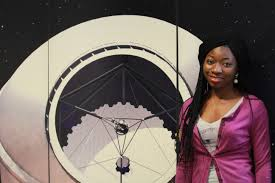
Aiming For A Career in Astronomy and Astrophysics in Canada
Margaret Ikape, the AIMS Cameroon alumna of the 2015/2016 cohort, holds a BSc in Physics and Astronomy from the University of Nsukka, Nigeria.
While at AIMS, Margaret analyzed in detail the origin and properties of those stars interacting with the binary black hole (BBH) extracting energy and quantify the structure in terms of the radial profile and triaxiality.
She is currently PhD candidate in the Department of Astronomy & Astrophysics and the Dunlap Institute for Astronomy & Astrophysics at the University of Toronto.
After AIMS, the Nigerian-born Physicist went on to obtain another Master’s in Astronomy and Astrophysics from the University of Toronto, Canada and is currently a Ph.D. student in the same field at the said University.
Passionate about bridging the gap between African Science students n the field of Astronomy, Ms. Ikape is currently part of an instructor team that organizes the Pan-African School for Emerging Astronomers, PASEA, a summer school aimed at introducing undergraduate students to the basics of astronomy using the inquiry method with a lot of hands-on activities, and at solidifying research and computing methods for postgraduate students. She was an instructor at this school’s 2017 and 2019 editions in Accra, Ghana, and Abuja, Nigeria respectively.
Margaret hopes that students will become aware of Astronomy and Astrophysics as a career option, and hopes to train the next generation of African Astronomers. She equally envisages a future where she is a role model to African youths, encouraging African girls, in particular, to pursue their dreams no matter what life throws at them.
Her research interests mostly revolve around answering the unknown questions in the universe. At present, she is interested in understanding how the first stars were formed, and what their roles were in making the universe look the way it does today. She is also interested in building telescopes that can peer deeper and deeper into space to see the cosmic dawn.
